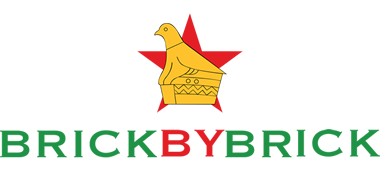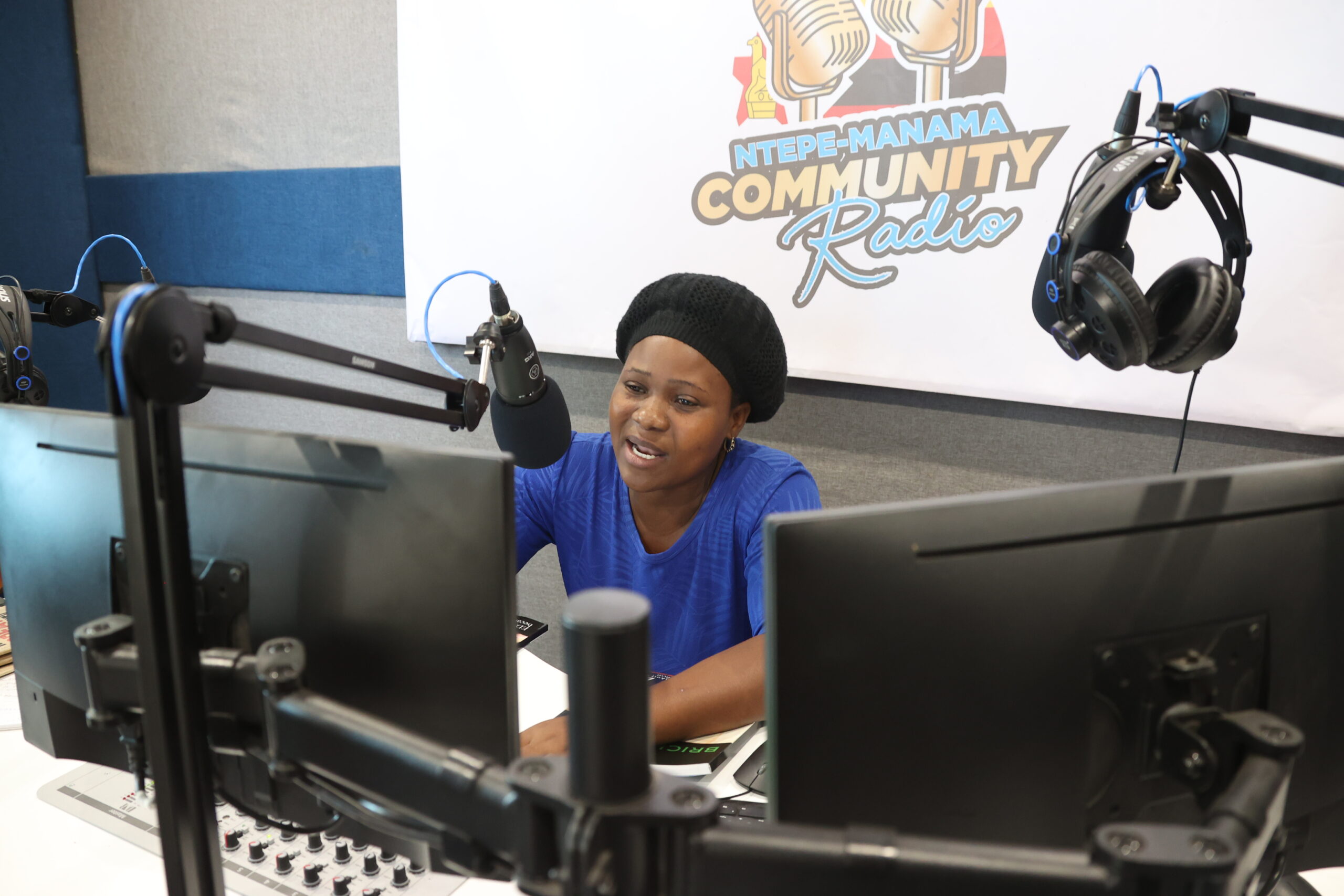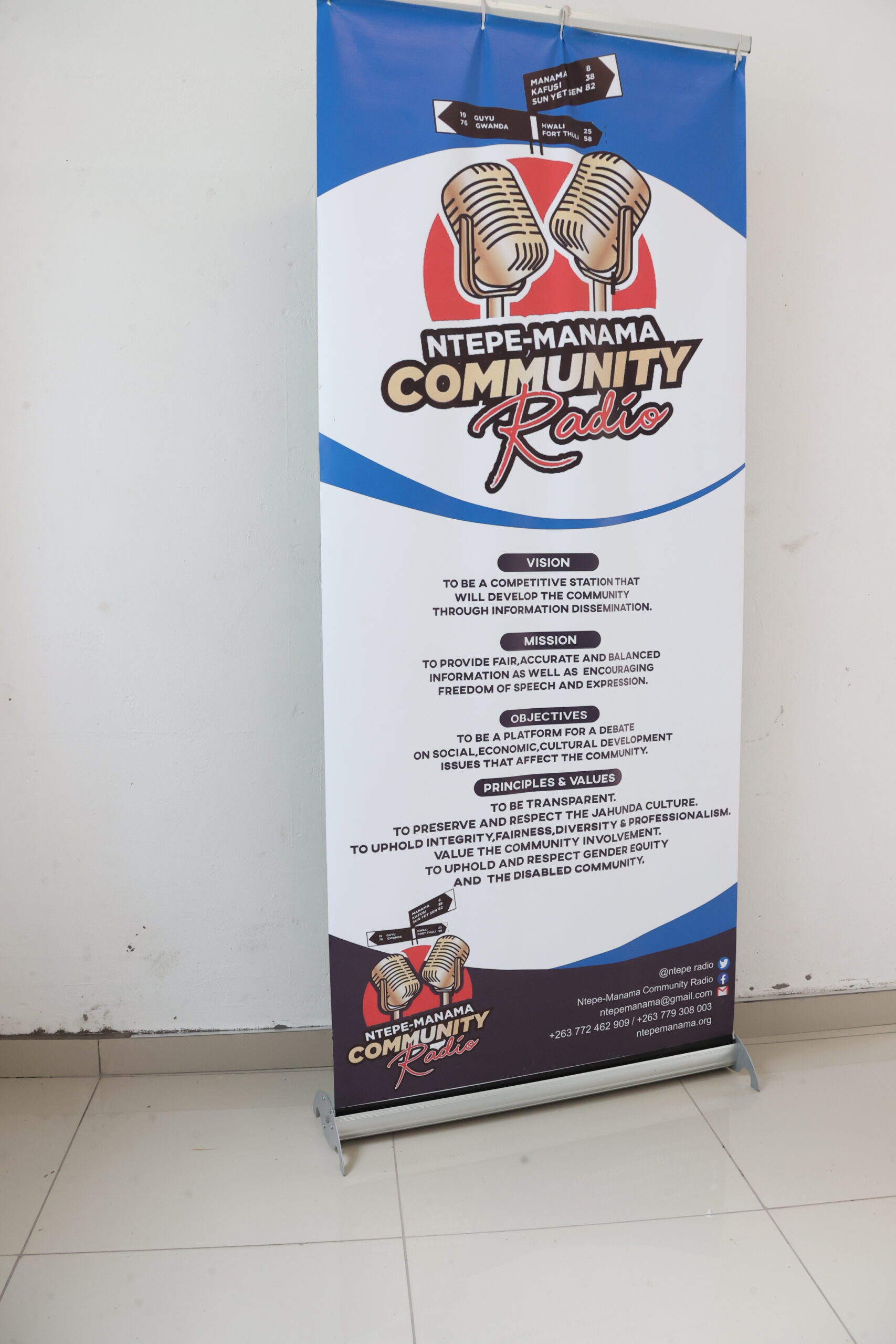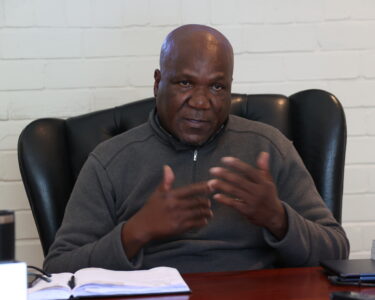“Until I can take pride in my language, I cannot take pride in myself,” goes a popular saying which basically means that linguistic identity is a mirror to one’s ethnic identity. During his visit to Matabeleland South, our Editor-in-Chief Munyaradzi Huni came face-to-face with Primrose Tiou, a volunteer at Ntepe-Manama Community Radio Station.
Primrose does not speak fluent English, but that is the least of her worries because she takes pride in her SeSotho mother language. She is a hugely popular presenter and newsreader at the radio station which broadcasts mainly in SeSotho. Below is the inspiring story of a lady who has taken it upon herself to serve her community by going out of her way save their language.
“I am from Ward 24 in Matabeleland South Province. I volunteered to work at this radio station because we wanted to upgrade our language. SeSotho had been buried for a very long time. It was not even used at school where we were taught Ndebele.
“I also volunteered because this community has been starving. There was no medium to disseminate information in our own language. We were getting broadcasts from foreign radio stations like Studio 7 and others from neighbouring countries like Botswana and South Africa. We could not access any of Zimbabwe’s radio stations.
“This is the first community radio station in this area and we are very proud of it. We use this radio station not only to promote our language but to inform and educate people about activities in our community. We discuss a variety of issues like farming, health, etc, as well as cattle rustling, which is rampant in this area, and human-wildlife conflict involving elephants. We also give our listeners the opportunity to come on radio to showcase their talents,” says Primrose.
The community is happy to finally have a voice, but ‘the transmitter is a coward’
Ntepe-Manama Community Radio Station was launched at the beginning of November 2022, as the Government scaled up the decentralisation of broadcasting services in line with the Second Republic’s philosophy of leaving no one and no place behind. The radio station gives the people in Ntepe-Manama the opportunity to articulate issues affecting their community in their own language.
“The people in this community are very happy that they finally have a radio that gives them a voice but quite a number are disappointed because our geographical coverage is limited. We can only reach listeners within a radius of up to 30 kilometres. During our programmes, we often use phone calls to inform people about some of the issues we will be discussing. Many people would like to participate in our programmes, but they cannot do so due to the limited geographical coverage. So they resort to using WhatsApp to share their ideas with us. The transmitter is a coward,” says Primrose.
A transmitter as a coward? Ever heard that? Well, that is how Primrose puts it and she is convinced the transmitter is indeed a coward.
It’s Sotho and nothing else
So, what is it like working for a community radio station? Says Primrose: “We start broadcasting around 6am and finish around 9pm. Today I was on radio from 9am to 12pm. I was discussing disability issues in the community. There is a misconception that if you have a disability then you can’t do anything and so my programme was aimed at showing people with disability that they can do a lot for themselves and the community. Some people even hide their kids who have disabilities. I want such people to open up so that they can get the necessary help.
“I also discussed the human-wildlife conflict in the community. Since the rains started, elephants have moved closer to people’s homesteads and they are destroying homes and fields. People in this area no longer feel safe to go about their daily chores. It’s difficult, for instance, for the villagers to wake up in the morning to look for their missing donkeys, goats or cattle.
“People are even afraid to go to their fields. They are scared of the elephants that are terrorising them. There is no freedom of movement because of the elephants and so we were talking about it on my programme.
“Most of our programmes are in Sotho. If someone comes with a programme that he or she wants to air in English, that person would have to come with a translator who will translate the programme into Sotho so that our listeners can understand the content. The majority of people in our community cannot speak or understand English. The listeners vary from the young to the old, depending on the programme. If the programme is about farming, we receive phone calls mainly from the more mature people and if it’s a light programme, like music, most of those calling us are youths,” says Primrose.
‘I am now popular and famous’
“Since I started working at this radio station, I am now popular in the community. I am now very famous. (she bursts laughing). I can read both Sotho and Ndebele news. Until I joined Ntepe-Manama, I had never worked at any radio station. This was my first time to talk on radio and I am really enjoying myself. Even though I had no formal training in broadcasting, my passion pushed me through.
“This job has really changed my life. Through this job, I have been sent to a number of training workshops in Bulawayo. I now know most of the do’s and don’ts in the media. Like I now know that in the media, one has to use his or her real name. You are not supposed to use someone’s picture without their consent.
“Even though I am now popular, I remain very humble so that I keep connecting with the community. I am inspired to do this job because of the response I get from the listeners. They send me messages and call me to express their support and appreciation. That on its own gives me the drive to improve my work on radio.
“We play 75 percent local music. I am talking of Zimbabwean music in general, but we also give a lot of airplay to music that is played in our language. We also play Venda and Ndebele music.”
Adjustable chairs, wifi and an air-conditioner would be most welcome
Primrose concludes by making an appeal.
“One of the biggest challenges we face is that we don’t have wifi here. We are also appealing for anyone to donate an air-conditioner. It’s very hot in this province and the heat in the studio is sometimes quite unbearable. We are also appealing for adjustable chairs that are suitable for a studio.
“Also, the Minister of Information (Senator Monica Mutsvangwa) promised to avail a bigger transmitter that can reach listeners 40-60 km away. However, I personally think that transmitter will still not be enough to serve the entire community. In other words, it will still be a coward!
“As for the team here, we have our coordinator Mvelo Zondo and a programmes officer Siphatisiwe Ncube. There are other presenters. In total there are about eleven people working here. Most of us are volunteers. We are doing all this for our community because this is a community radio station. The community owns the radio station. We don’t have a sponsor yet, but I think it would be a good thing to have one.
“Despite these challenges, we are going to make sure that this station keeps on broadcasting. We thank the government for remembering us.”
In line with the devolution policy, community radio stations give a voice to people who lack access to mainstream media and help expedite the dissemination of information.





